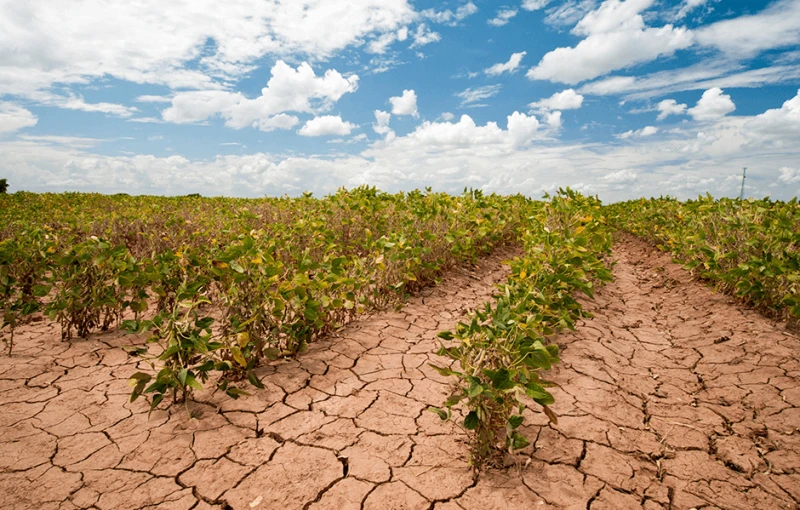Here is how genetically engineered crops can aid in the quest for food security amid a changing climate
Here is how genetically engineered crops can aid in the quest for food security amid a changing climate


Many food crops can only grow under certain climate conditions, which means too little or too much heat or rainfall can spoil entire harvests. So far in 2024, record-breaking floods and heatwaves have devastated parts of the United States, Europe, Asia and Brazil. Oddly enough, droughts are also becoming more commonplace — adding the potential for a drop in crop yields and a boost in food prices across the globe.
A possible solution is to genetically modify crops to make them more resistant to these ever-increasing climate shocks. Genetically modified foods, also known as genetically modified organisms (GMOs), have long been the subject of controversy as many consumers fear they may have negative effects on human health. But over 100 research studies by everyone from the American Medical Association to the World Health Organization, have found that such fears are widely unfounded and that genetically modified foods are safe for consumers.
GM crops can be engineered to be more resistant to droughts in comparison to conventional crops, by making them strong enough to flourish with a fraction of the water required by non-GMO crops. They can also be made to resist pests and diseases — which could greatly reduce the need for toxic, environmentally damaging pesticides.
…
However we proceed, it’s clear we must learn on the fly — as our rapidly changing climate presents an ever more pressing threat to both human health and the health of our global food supply.
Even the University of Queensland’s Karen Massel, who advocates for scaling the use of GM food crops, admits that “there are valid concerns” including “unintended consequences for ecosystems” — adding that “the development of future foods must be guided by a commitment to sustainability, social justice and scientific rigor.”
This is an excerpt. Read the original post here

 | Videos | More... |

Video: Nuclear energy will destroy us? Global warming is an existential threat? Chemicals are massacring bees? Donate to the Green Industrial Complex!
 | Bees & Pollinators | More... |

GLP podcast: Science journalism is a mess. Here’s how to fix it

Mosquito massacre: Can we safely tackle malaria with a CRISPR gene drive?

Are we facing an ‘Insect Apocalypse’ caused by ‘intensive, industrial’ farming and agricultural chemicals? The media say yes; Science says ‘no’
 | Infographics | More... |

Infographic: Global regulatory and health research agencies on whether glyphosate causes cancer
 | GMO FAQs | More... |

Why is there controversy over GMO foods but not GMO drugs?

How are GMOs labeled around the world?

How does genetic engineering differ from conventional breeding?
 | GLP Profiles | More... |

Alex Jones: Right-wing conspiracy theorist stokes fear of GMOs, pesticides to sell ‘health supplements’




 Viewpoint — Fact checking MAHA mythmakers: How wellness influencers and RFK, Jr. undermine American science and health
Viewpoint — Fact checking MAHA mythmakers: How wellness influencers and RFK, Jr. undermine American science and health Viewpoint: Video — Big Solar is gobbling up productive agricultural land and hurting farmers yet providing little energy or sustainabilty gains
Viewpoint: Video — Big Solar is gobbling up productive agricultural land and hurting farmers yet providing little energy or sustainabilty gains Fighting deforestation with CO2: Biotechnology breakthrough creates sustainable palm oil alternative for cosmetics
Fighting deforestation with CO2: Biotechnology breakthrough creates sustainable palm oil alternative for cosmetics Trust issues: What happens when therapists use ChatGPT?
Trust issues: What happens when therapists use ChatGPT? 30-year-old tomato line shows genetic resistance to devastating virus
30-year-old tomato line shows genetic resistance to devastating virus California, Washington, Oregon forge immunization alliance to safeguard vaccine access against federal undermining
California, Washington, Oregon forge immunization alliance to safeguard vaccine access against federal undermining The free-range chicken dilemma: Better for birds, but with substantial costs
The free-range chicken dilemma: Better for birds, but with substantial costs ‘You have to treat the brain first’: Rethinking chronic pain with Sanjay Gupta
‘You have to treat the brain first’: Rethinking chronic pain with Sanjay Gupta
